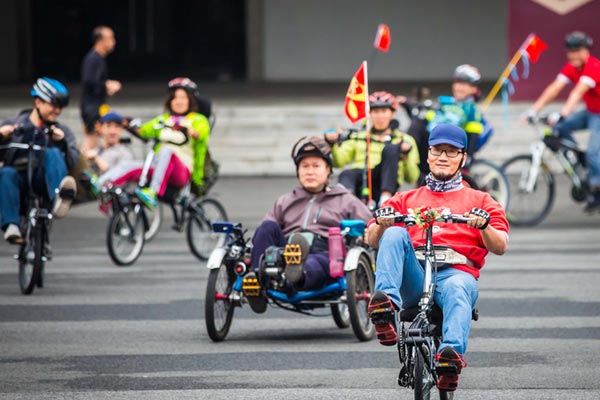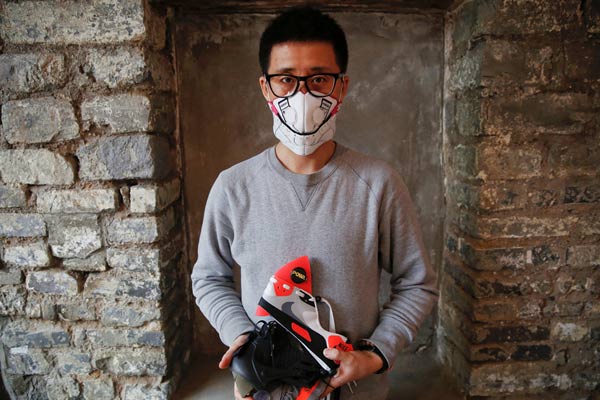

Violators detained for trying to carry more than allowed into mainland
Since it took effect on Friday, 45 people have been detained in Hong Kong for violating a new limit on the amount of infant formula than can be taken to the mainland.
The detainees, 26 Hong Kong residents and 19 from the mainland, tried to carry 178 cans of milk powder, each weighing 1.2 kg, through customs into the mainland, Lai Tung-kwok, head of the Security Bureau of Hong Kong, said on Sunday.
Under an amendment to Hong Kong's export and import law, from March 1, a person can carry only two cans, or 1.8 kg, of baby formula out of Hong Kong, and the person must be at least 16 years old. Violators face fines of up to HK$500,000 ($64,500) and two years in jail.
Among those detained was a 47-year-old man who confessed to attempting to cross the border with 11 cans of milk powder on Friday. Nine of the cans were confiscated on Saturday and he was fined HK$5,000.
The law amendment was passed to prevent the influx of traders who buy milk powder in Hong Kong and resell it on the mainland for a profit, mainly to families who have no faith in mainland-produced infant formula.
Many Hong Kong residents complained about formula shortages because of that trade.
Lam Xiu-ling, 31, a teaching assistant at a primary school, from Fanling in the New Territories of Hong Kong, says her year-old son goes through a can in five days.
She said the formula shortage was once so acute that it took her two days to find a store with a supply.
Lam said she hoped more rigorous supervision of the dairy industry on the mainland would result in safe products for babies.
The limit was introduced to prevent the traders from disrupting the Hong Kong market, Tam Yiu-chung, a member of the Hong Kong's Legislative Council, told media on Saturday while in Beijing for the Chinese People's Political Consultative Conference.
Even with limited purchasing allowed for mainland parents, baby formula from Hong Kong cannot possibly meet the huge demand on the mainland, Tam said, and the answer lay in raising consumer confidence with higher food safety standards.
He said mainland authorities could also consider allowing more imported milk powder.
Lyu Xinhua, spokesman for the CPPCC and former commissioner of the Ministry of Foreign Affairs in Hong Kong, said on Saturday that 99 percent of milk powder produced on the mainland meets quality standards, but people have low confidence in these products and prefer foreign brands sold in Hong Kong.
Xu Jing, 31, mother of an 8-month-old girl in Shenzhen, Guangdong province, said she believed that 99 percent quality rate given for milk powder produced on the mainland was inflated.
Even if the quality is improving, she said, consumer confidence may not turn around in one or two years, and parents will never use their children, in many cases, their only child, as guinea pigs.
Also, the new generation of parents have more financial resources and time to think about not only how to keep their children safe, but also to make sure they are fit and healthy, Xu said.
Xu uses milk powder bought in Hong Kong to feed her daughter, because of Shenzhen's proximity. She said her family there also had to visit a dozen stores to find one that has stock and had been hit by increased costs.
"We saw prices go up about 30 yuan per can," she said. "That means 120 yuan more a month."
It is a headache Li Fang will face in about seven months. The 37-year-old Beijing mother has a 5-month-old daughter who she plans to breastfeed until she is 1 year old.
Li, a journalist, is also suspicious of the authenticity of the claim that 99 percent of milk powder produced on the mainland meets quality standards. She said information on such matters is not transparent.
Li said she will buy formula from Hong Kong, and many of her friends are doing the same if they can afford the higher expenses.
"I don't like the new limit because it affects my own interests," Li said. "But I also understand it is necessary."
Wang Dingmian, former vice-chairman of the Guangdong Dairy Industry Association, said Hong Kong's new regulation will have a limited effect on the mainland market, which has an estimated sales volume of 43 billion yuan.
The sales volume of formula sold in Hong Kong to mainland customers is estimated to be 1 billion yuan, accounting for less than 3 percent of the market share on the mainland, he said.
Wang said price hikes due to reduced supplies under the new regulation were seen mainly in Guangdong province, where many people take advantage of the proximity and border pass conveniences to be parallel traders.
Foreign brands may increase their supply to the mainland market and appear to gain because of the new regulation, Wang said. The dairy industry on the mainland should think about why foreign brands are trustworthy among Chinese consumers.
liyao@chinadaily.com.cn
??
 Cyclists sit back as they pedal through Guangzhou
Cyclists sit back as they pedal through Guangzhou
 Liquor enterprises enter busy season in N China
Liquor enterprises enter busy season in N China
 Monkeys enjoy Christmas feast in Zhengzhou
Monkeys enjoy Christmas feast in Zhengzhou
 Beijing designer turns sneakers into smog masks
Beijing designer turns sneakers into smog masks
 Oddly-shaped daffodil bonsai catches eyes in Shenzhen
Oddly-shaped daffodil bonsai catches eyes in Shenzhen
 Young visitors astonished by space experience in Zhengzhou
Young visitors astonished by space experience in Zhengzhou
 Localized Jeep Compass to hit the market
Localized Jeep Compass to hit the market
 Figure based on Qing Dynasty founder a rage in Shenyang
Figure based on Qing Dynasty founder a rage in Shenyang